LAZ ALONSO is no stranger to the world of film and television. From hard-hitting films like “Straw Dogs” under the direction of Rod Lurie, to the action-packed excitement of the “Fast & Furious franchise or fantasy of “Avatar”, not to mention lighter fare like “Jumping the Boom” or television police procedurals like “NCIS”, “Without A Trace”, “Deception”, “Southland” and “Person of Interest”, Laz Alonso tackles it all. With a marketing degree in hand and as a former Wall Street investment banker, Laz Alonso may be the last person you’d expect to see on screen, but it’s that very background that serves as a foundation for the roles he selects, allowing him to have those harder, more precise, defining edges.
But thanks to writer/director Deon Taylor, Laz now pushes himself and then some, spreading his performance wings and stepping into uncharted waters with the strongest, and most emotionally diverse performance of his career with TRAFFIK. A hybrid romantic drama that morphs into a timely and topical thriller on sex trafficking, Laz Alonso is perfection as Darren, a hustling sports talent rep, who believes life runs at one pace – fast. In Darren’s mind, the world revolves around him and what he says goes thanks to his fast-talking salesmanship and throwing money around like it’s water as a means to impress not only others, but himself. But what happens when Darren and his friends are forced to face the real world and the hustle doesn’t work with hardened criminals?
Embracing that dynamic and energy, Laz Alonso brings defining depth and texture to Darren, making him a polarizing character not only within the film itself, but for the audience as well. Electrifying in TRAFFIK, Laz is equally so in person but with an added warmth and welcoming genuineness, as I quickly found out when I sat down with him for this exclusive interview. . .
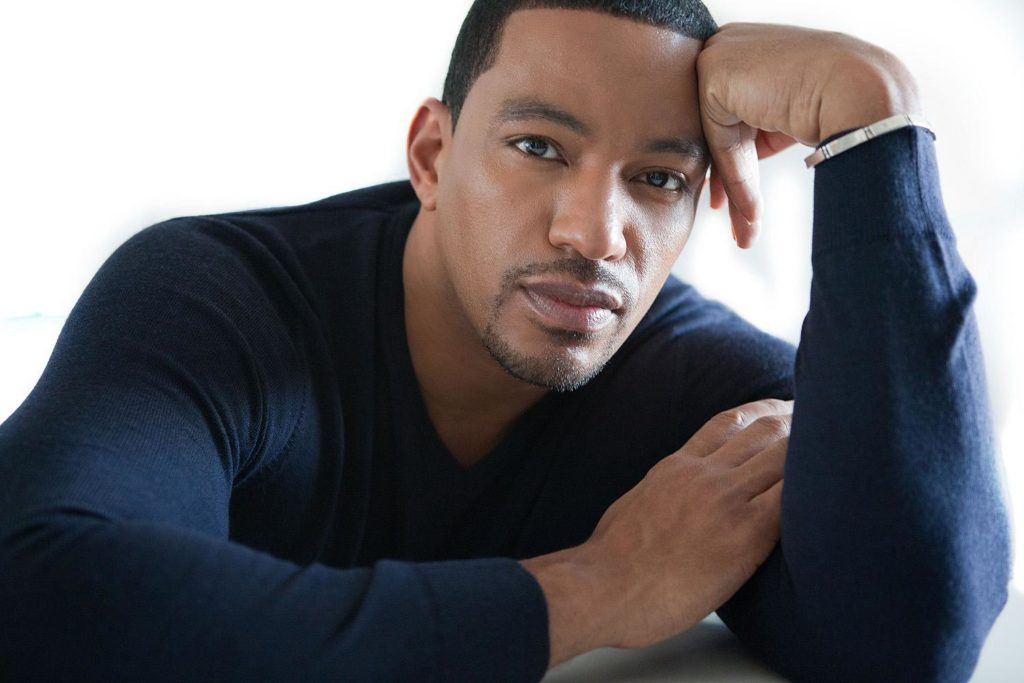
I’m so happy to see you survived shooting with Deon! You did a hell of a job in this film.
Thank you. Thanks a lot. I appreciate that. That actually was the easy part. You know?
For me to see you in this role, in the character of Darren – because I am so used to seeing you in police procedurals, or something like “Southland” or “Straw Dogs” – is amazing.
So, you know what the motivation behind that is, is I was so used to seeing myself in all of these roles, these straight and narrow roles, and finally I got a role that I could just let loose, and just be free, that it was such a great opportunity artistically, just to stretch on camera. And I was like “Oh, yeah, I’m gonna have some fun with this.” And I had a blast. I can’t lie. I had a blast.
It comes through on the screen, Laz, it comes through. And you know, it’s not just when we look at your one-offs in TV series and your other roles, but also, your whole background: straight arrow, Wall Street, marketing, investment banking. That’s all very cut, dried.
Very calculated. Yeah.
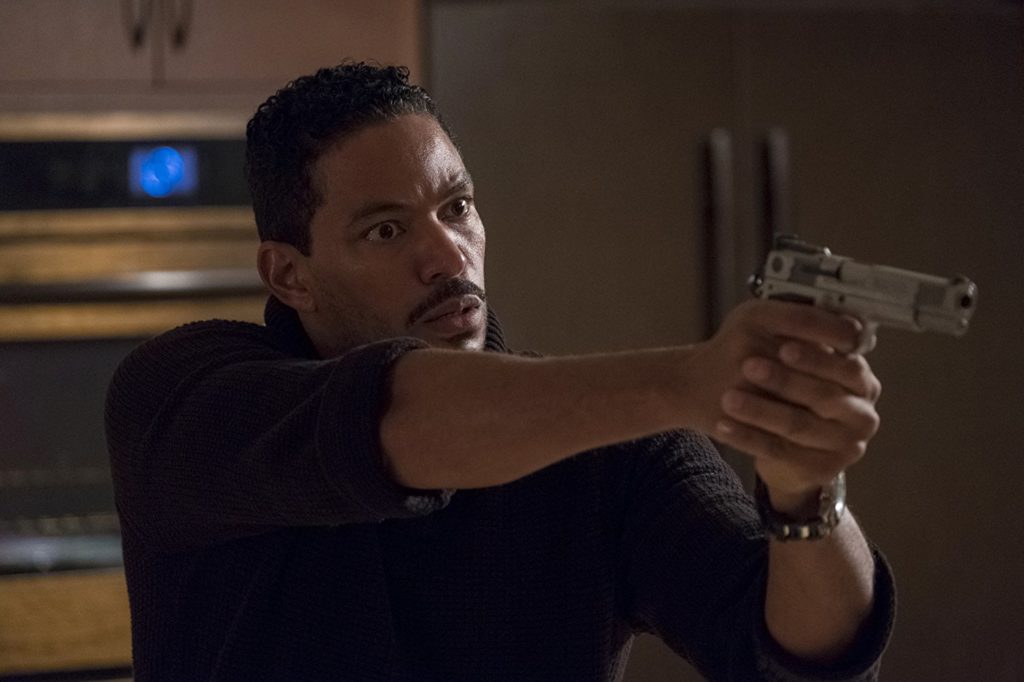
But here, with TRAFFIK, you really did get to bite into this role and this film. This script is not what you’re used to seeing, but this is a story that the movie-going public on a whole is also not used to seeing. What did you think when the script landed in your lap?
Well, the first thing that came to my mind was Deon, who I wasn’t very familiar with his work. But I became familiar after I read the script and I liked what he wrote. But I was like, “Okay if this director can successfully shoot what’s on the page, this is a good movie. Just regardless of who played the characters.” And then getting on set, and the freedom that he gave us to just be the character. You know, like it’s no longer his script. The minute you get on set, it’s no longer his script. He trusts his actors. And I’ll never forget, I mean one of the best things a director has ever told me on set is what Deon told me when I went to ask him about a line that I wanted to change, he told me, he said “Fuck the script.” The script that he wrote, by the way. He said, you know “F the script.” He said “Listen, man.” He said “Do what you wanna do.” He said “Do you, man.” He’s almost like a motivational speaker. He said “Come on, man, you’re good, man, you’re good, you’re a good actor, you’re a great actor, man, just do you, man. I trust you with whatever you wanna do, and just go. If I need to pull you back, I’ll pull you back, but just go, be free with it.” And when he said that, that level of trust and enthusiasm, and also it kind of pumps you up, you know?
Absolutely.
I told him, I said “If I ever became a boxer, I’d need you in my corner.” Because the minute he goes action, you’re ready to go beat somebody up after you get a pep talk from Deon. But he really trusted me. And at that point I was like “Okay, I’m just gonna run free, I’m gonna run wild with this, and let’s see what happens.” And it worked.
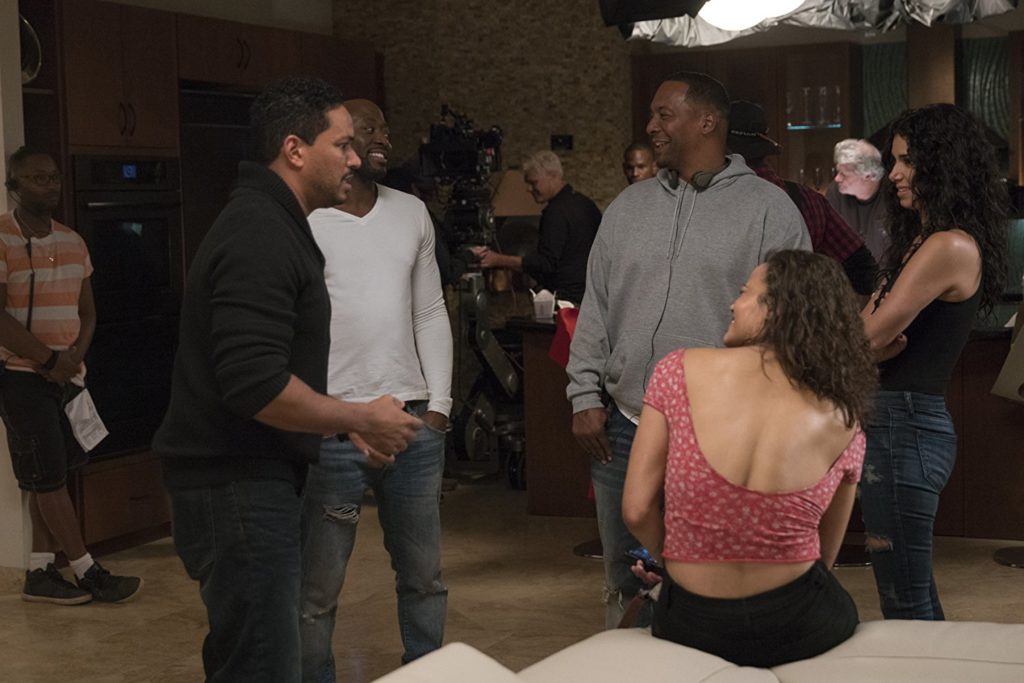
And then you get Roselyn [Sanchez] as a playmate to run with you, because this is also something … She’s always played these strong women similar to you playing, FBI agents, cops, things like that – and here she gets to break loose.
Right. Right. And she has so much fire. She has so much of that Latin energy that we fed off of each other because we communicated not just as a couple who was having problems, but as a Latin couple that was having problems. So that energy was slightly different than Omar [Epps] and Paula’s [Patton] characters. And you could see it and feel it. And I grew up around that. In a Latin family, everyone knows the problems that everybody else has, and nobody really wants … They don’t do a good job at hiding them. The sarcasm and the passive-aggressive one line jokes are very common in my family. And then the quiet right after, and the brewing tension. You feel that volcano bubbling until it finally explodes. It’s something that I just saw growing up, and we were able to kind of capture that in the film.
Well, you did a beautiful job. Deon had me come take a look at it last year while it was still in the editing phase, as he wanted my feedback because we’ve known each other so long.
WHAA!! That’s awesome! I love hearing stories like this.
You were exploding off the screen then. Color correction wasn’t done. There was only temp music or no music in places. One of my big notes to him was to ratchet up the tension, “you need more tension, ratchet it up”. It was there, it was simmering, but he needed more. But the biggest tension at that stage of editing was coming from you and what the character of Darren was doing to obfuscate the sensibility of “Let’s call the cops, let’s call the cops.” And now to see what Deon did from last year, to go back in, with editing, with the score, now, you’re jumping out of the seat watching this, especially when Darren, the minute he goes into the bathroom, he turns around and he’s snorting coke, you know something is going to explode.
Right.
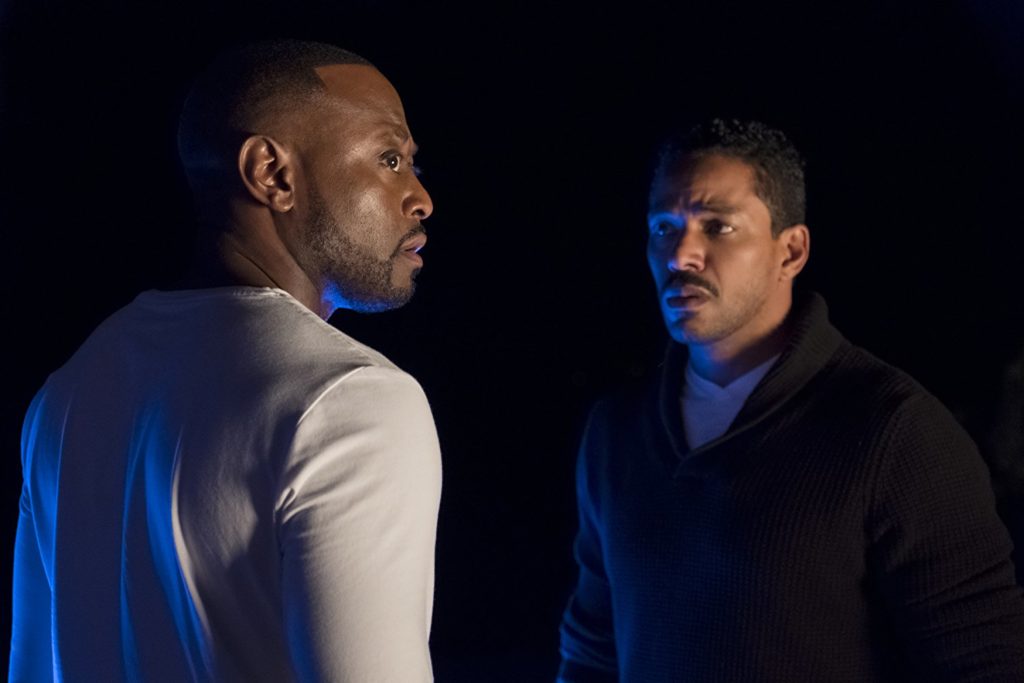
And that’s exactly what it does. It explodes! And we get this showdown between you and Luke Goss which is fabulous. That starts the real nail-biting moments in that film. And it’s you and Luke pulling that off!
You know, first of all, thank you for your words and thank you for contributing, and lending Deon that kind of collective, creative feedback, because I didn’t see the film for a year after we did it. So I got to screen it really a few months ago. I’d forgotten a lot of what we did, and that’s one thing I definitely felt was … He got it. He got that tension, like I grew up on “The Hand That Rocks the Cradle”, “Sleeping With the Enemy”, “Fatal Attraction”.
And you’re on the edge of your seat. It’s nail-biting.
You’re on the edge of your seat, right. You’re yelling at the people, you dislike the people, you’re so invested. And that’s what I felt like this story, at least the Darren character. He had to be someone that you truly, truly had strong feelings for, whether you hated him or loved him, it had to be strong.
There’s no middle of the road with Darren. No.
Can’t be, and you disliked him, I want you to hate him. If he reminds you of somebody, I want him to remind you of somebody you strongly had feelings for, and the reason is because in a movie like this, it really is balancing people’s emotions. And filling up that balloon, and then letting it go, and then filling it back up again, letting it go, and then every time you fill it up, you fill it up more and more. And I’m just so happy with this film because I feel like Deon got it. He captured that.
He certainly did. How exciting is it for you as an actor to finally have a role like this that you really get to bite into, and you get to fill up, and let it out, and fill it up again, and let it out?
I’m gonna tell you that this is exactly why I did this movie. Because coming from doing big studio films, and then doing network television, you don’t have those opportunities like you do in independent film. And independent film is where you can really tell a story, and it’s character-driven stories. When you look at the Oscars and a lot of these films that are getting nominated and getting recognition, they’re character movies. At the end of the day our industry, we still love acting. Meryl Streep doesn’t win awards because the film had explosions. She wins awards because of the acting. And independent film is where you can still have those opportunities to stretch and to show what you can do on film, and to really bring it to life. To tell the story through the character. Character-driven stories.
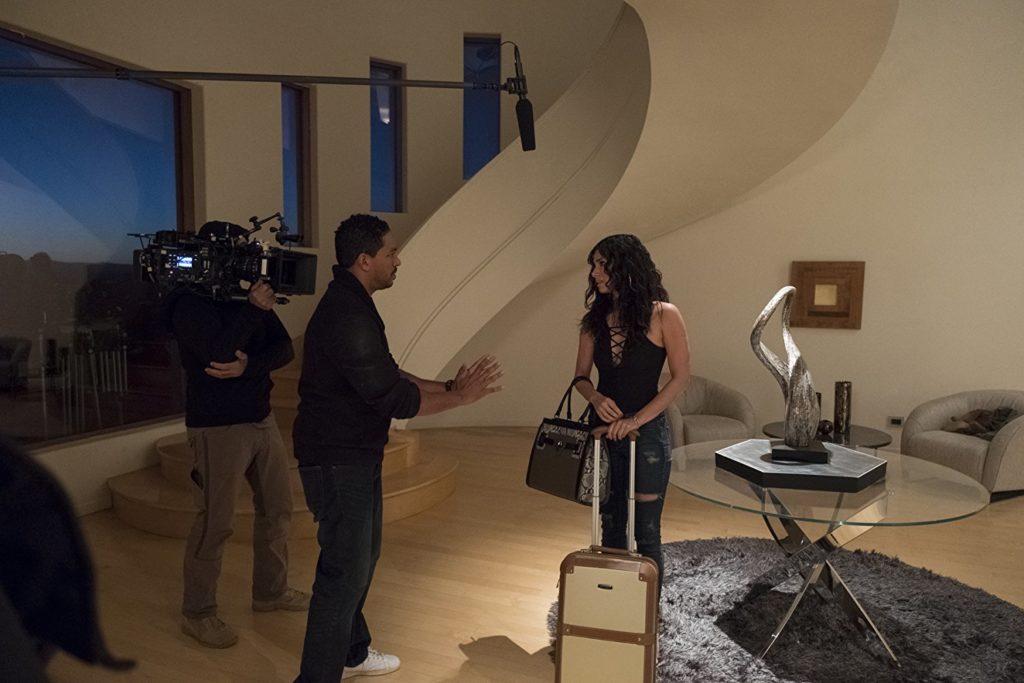
But now in this film, in addition to the story being character driven, this is also very location driven, and I’ve got to say, you got to work with Dante [Spinotti], one of the best cinematographers in the business. Location is always important. When you’re buying real estate it’s location, location, location. But for you as an actor, in a film like this, location, location, location is also important, and what your cinematographer does with that.
Right, right. I think also, one thing that I noticed was when the movie really kicks into high gear, it becomes all night shoots. And it kind of takes us back to that childhood fear of the dark. And we’re filming in a place where we got no cell service, we’ve got no wifi, and we barely have TV on breaks. And it was pretty remote.
You legitimately could have found yourself in the position that Malia or Darren, John, and Brea were actually in. Somebody could have come up out of nowhere.
Easy. Easily, because your nearest neighbor is probably about five miles away. Just getting to the house, it was an unfinished dirt road, one of the vans slid off the road. Well, I mean, getting into the house was hard from base camp. And base camp was on a ranch in a horse stable. So making it from the van to your room without stepping in “land mines” was a mission, which I felt many a night. So it was like all those things put together just kind of reminded you of how spoiled and how lucky we are, but this kind of being spoiled and lucky and having access to wifi everywhere and all this other stuff, it makes you feel this sense of false safety, and false security. And anything can happen to anyone at any time.
And I think that that’s what this film kind of does. Deon wrote this film. He was inspired by his daughter to write this film because once he started diving in and doing the research, he was like, this can happen anywhere. Right here in Sacramento, the state capital. And that’s what I feel like I learned from this film. Friends of mine who go hiking alone, don’t go hiking alone. I don’t care if there’s a trail. You don’t know who’s in those bushes. And who might be up there hiding, and for what reason. Just kind of the way it just makes you not take those things for granted as much.
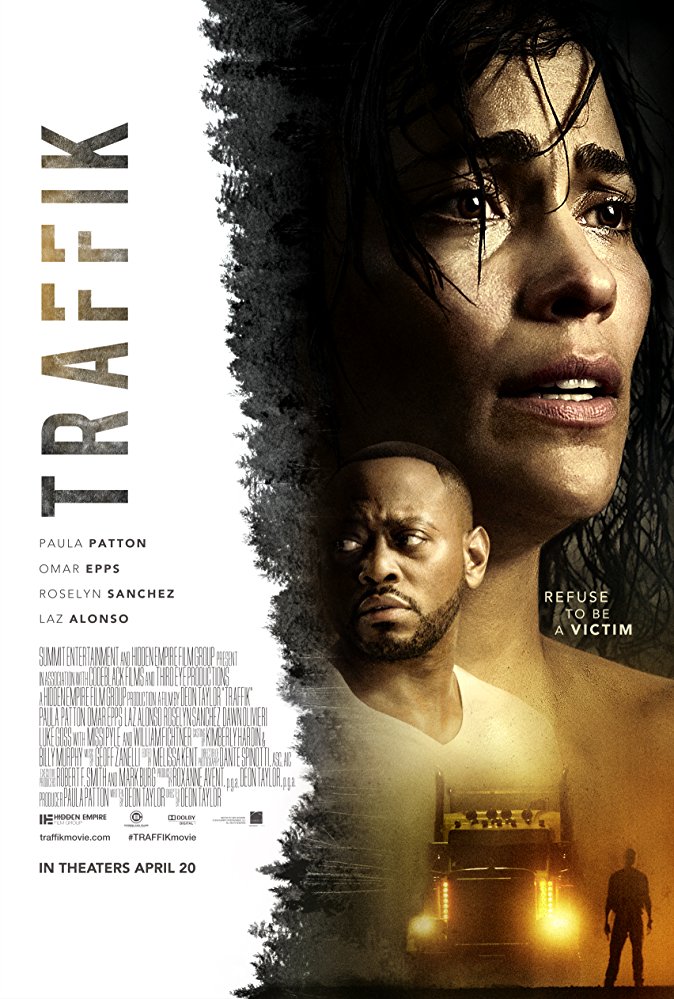
Laz, now that you’ve made it through this film, you’ve made it through TRAFFIK, and as you move forward into other projects, what did you learn about yourself that you will now take with you into your future projects?
I would say to always put the work first. There’s a balance that we’re always trying to find between artistry and comfort in this business. Sometimes the artistry doesn’t necessarily give you the comfort that you need, especially if you have a family and kids, or elderly parents so on and so forth. And then there’s jobs that give you the comfort, but may not give you the artistic satisfaction that you get from other things that challenge you a little more. And so to me, I’ve had the opportunity to do both, and artistry wins every time. This was like the little movie that could, the little train that could, but I got so much out of it, and sitting down with you, and getting the kind of feedback that you give me for this performance, means the world to me.
And that’s why I do this. It’s because I feel that I have something to share, and you don’t get that many opportunities to let that out like you do in movies like this.
by debbie lynn elias, interview 04/14/2018












